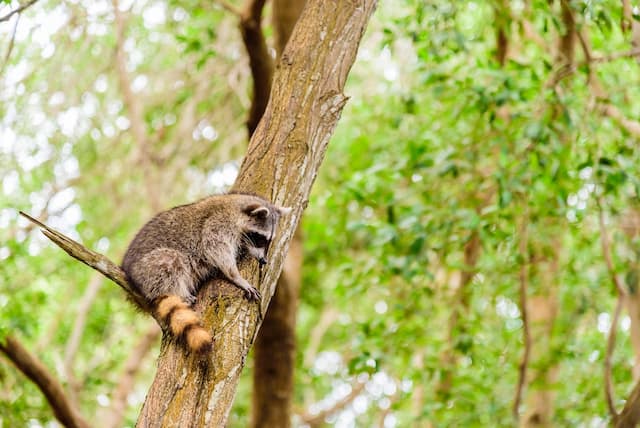Raccoons are opportunistic pests that can adapt to any environment as long as there is food and shelter. Your deck could be their habitat, but you have to understand that these furry visitors are quite a nuisance and, most of all – carriers of the disease.
Adult raccoons always roam about and can enter your home and establish their den on your deck. If you have trees close to the house, they will use it to access the ceiling. Raccoons are omnivorous and will scavenge through trash cans for discarded food and other leftovers in the pet dishes to satisfy their hunger. They are sure going to make a mess of your outdoors.
To keep your property free from raccoons;
Avoid Things that Attract Them
Trash cans, bird feeders, and pet dishes will always attract raccoons to your compound. Keep the bird feeders or pet dishes covered or inside the house at night. Make sure your trash cans are empty and clean. You can seal them with a lock or use bungee cords for the lids. Do not leave any food lying around.
Seal Off Your Property
Raccoons can do anything to get food – from squeezing through the holes and cracks to climbing up the fence when hungry or if they smell food in your compound or trash can. Use preventive barriers such as perimeter fences to seal off any easy entry points. Fill up any holes or vents you may find in the roof, foundation, chimney, or siding of the house since they can be scratched open to form an entry point.
Surround your compound with an electric fence to keep them out. This long term solution will help keep out all kinds of wildlife. Also, keep trees and shrubs away from the wall or house to prevent raccoons from climbing through.
Use Motion Detectors
Motion detectors can be used together with security cameras, motion-activated sprinklers, and ultrasonic systems to deter raccoons and other wild pests from entering the home. If paired with an alarm system, the pests can be scared off.
Use Traps
Raccoons will keep coming to your property if they can get food to eat. If you have a basement, chimney, attic, or any crawl spaces available in your house, they will create a den and stay. To shoo them away, you can use cage traps and other preventive measures that will make them leave for good.
Different states have specific laws governing raccoon trapping. You will need a permit and follow trapping instructions on how to cage them safely. Set traps in strategic areas and leave them out overnight. You can bait them with nut butter, fruits, or pet food.
Check all traps in the morning, and if you catch one, relocate it according to state regulations. You can take it 10 miles away from your home into the forest or call professional humane wildlife removal providers to take care of it. Do not let the raccoon be trapped for too long because it may injure itself while struggling to set itself free. The animal may also dehydrate and die if it stays trapped for long without getting attended to.
Conclusion
Raccoons are brilliant and stubborn animals. To deal with them effectively, you will need the services of a wildlife removal expert. The expert raccoon removal Hamilton has experience with such instances and will find the best possible solution to help you eliminate the pests and clean up the place to avoid any diseases resulting from contamination through saliva, feces, and other means.

